Major Works
by Mestrovic
Emile
Durkheim and the Reformation of Sociology
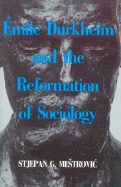
About this title:
"An important contribution to the understanding of the
sociology of Emile Durkheim."
--Choice
"Much has been written about sociology's
intellectual crisis, but few promising solutions have been
offered. Mestrovic nominates Durkheim as the perfect 'totem'
to achieve a contemporary reconciliation of the conceptual
gap characterizing modern sociology....For the serious
Durkheim scholar, this work is a treasure trove."
--Contemporary Sociology
"A refreshing reappraisal of Durkheim's
sociology. This work should interest a range of
sociologists, but especially sociological theorists,
Durkheim scholars and those in the sociology of knowledge."
--Sociological Inquiry
The
Balkanization of the West: The Confluence of Postmodernism
and Postcommunism

About this title:
In this passionate, vigorous and uncompromising book,
Stjepan Mestrovic argues that, instead of reacting
immediately and authoritatively to the horrible crimes
against humanity in the former Yugoslavia, the world has
acted the voyeur--passively watching, monitoring, observing,
but taking no action to end the killings. "The Balkanization
of the West takes the lid off that confused Western response
to the Balkan war. The demise of communism that began in
1989 coincided with widespread discussion of postmodernism.
But instead of leading to the end desired by postmodern
theorists, namely tolerance, it has led to the genocide we
are seeing in Ex-Yugoslavia. Furthermore, the brutal,
current Balkan War may be a harbinger of similar savagery
about to erupt in the former Soviet Union, especially in its
Southern frontiers and against its Muslim minorities.
Mestrovic analyzes how postmodern media contributed to the
current state of voyeurism to the point where genocide is
tolerated. By attempting to solve the current Balkan War
through pure negotiation and other "rational" means derived
from these Enlightenment narratives, the west has placed its
credibility on the line. Indeed, the current Balkan War is
depicted by opinion-makers in the information media in
frankly apocalyptic, post-modern terms, as the end of the
EC, UN, NATO, American leadership, and civilization itself.
Thus, the "real" war in the Balkans has been reduced to mere
metaphors and euphemisms--Balkan tribalism, ethnic conflict,
ethnic cleansing--while these same metaphors, paradoxically,
seem to apply to the once seemingly unified West. "The
Balkanization of the West is aimed at a wide and
interdisciplinary audience, and will be of great interest to
all those who seek a thorough and complex evaluation of the
ongoing events in the former Yugoslavia.
Durkheim
and Postmodern Culture
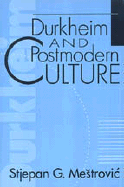
Habits
of the Balkan Heart: Social Character and the Fall of
Communism
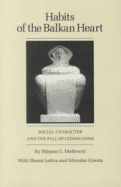
Postemotional Society

About this title:
Arguing that the focus of postmodernism has been on
knowledge and information, Postemotional Society
demonstrates how the emotions in mass industrial societies
have been neglected to devastating effects. Using a wealth
of information, author Stjepan G. Mestrovic shows how
emotion has become increasingly separated from action; how
in a world of disjointed and synthetic emotions social
solidarity has become increasingly problematic; and how
compassion fatigue has increasingly replaced political
commitment and responsibility. Mestrovic's argument is
rigorous and thorough, discussing the relation between
knowledge and the emotions in thinkers as diverse as
Durkheim and Baudrillard, as well as examining the carnage
in the former Yugoslavia. This stimulating and provocative
work concludes with a discussion of the postemotional
society, where the peer group replaces the government as the
means of social control. Postemotional Society will be read
as critical commentary and as social and cultural theory in
the great sociological tradition of Veblen, Riesman, and
Mills and thus will be invaluable to students in the fields
of sociology, social theory, and political science. "A
valuable and stimulating learning experience . . .
accessible, finely written, passionate, and important."
--Keith Tester, Professor of Sociology, University of
Portsmouth
The
Barbarian Temperament; Toward a Postmodern Critical Theory
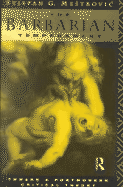
About this title:
The scintillating book by one of hte most interesting young
sociologists currently working in the USA is a provocative
and timely contribution to the debate on civilization,
modernity and postmodernity. The author argues that
modernity never jettisoned barbarism. Instead barbarism was
repackaged in modern and postmodern traditions and cultures.
This
Time We Knew: Western Responses to Genocide in Bosnia
By Thomas Cushman and Stjepan G, Mestrovic (Editors).

About this title:
"We didn't know." For half a
century, Western politicians and intellectuals have in this
fashion explained away their inaction in the face of
genocide in World War II. In stark contrast, Western
observers today face a daily barrage of information and
images from CNN, the Internet, and newspapers about the
parties and individuals responsible for the Balkan War and
crimes against humanity. The stories, often accompanied by
video or pictures of rape, torture, mass graves, and ethnic
cleansing, available almost instantaneously, do not allow
even the most disinterested viewer to ignore the grim
reality of genocide. And yet, while knowledge abounds, so do
rationalizations for non-intervention in Balkan affairs -
the threshold of "real" genocide had yet to be reached in
Bosnia; all sides were equally guilty; Islamic
fundamentalism in Bosnia is a threat to the West; it will
only end when they all tire of killing each other - to name
but a few. This Time We Knew punctures once and for all
common excuses for Western inaction in the face of
incontrovertible evidence of the most egregious crimes
against humanity to occur in Europe since World War II.
Reluctant Modernity: The Institution of Art and Its
Historical Forms: The Institution of Art and Its Historical
Forms
By Ales Debeljak and Stjepan G. Mestrovic (Editors)
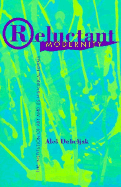
About this title:
In this book Ales Debeljak offers a
refreshing alternative to postmodernists such as Baudrillard
who declare the death of art conceived as yet another source
of rootless, circulating fictions. Inspired by the
melancholy critical theory of Adorno and Benjamin, and
drawing on Weber, Debeljak shows that with the dawning of
modernity, art was made autonomous -- art production was
effectively emancipated from the exigencies of everyday life
and its guiding ideal of purposive rationality. The
Renaissance brought on the first stage in a long, gradual
withdrawal of art from the hitherto dominant mythological,
religious, and aristocratic legitimization. Yet it was not
until the 18th century that art assumed the separate status
of a commodity to be bought and sold. But art paid a price
for its autonomy; through commodification art production
ultimately become an extension of capitalist logic and
control. The deterioration of bourgeois liberal
individualism into the narcissism of mass society
accompanied the decomposition of art into simplified mass
art and commercialized kitsch. Maintaining its formal
autonomy (museums, galleries, etc.) its content became the
universal object of indirect corporate exploitation. Today
postmodern art, argues Debeljak, is subjected to infinite
reproducibility, total integration into mass society, and
political resignation -- no longer representing an
alternative reality. The postmodern institution of art thus
cannot be simply cured of modern structures and assumptions,
but is, instead, fated to a continuous and painful
relationship with modernity
Feeling
and Form in Social Life
By Lloyd Sandelands & Stjepan G. Mestrovic (editors)
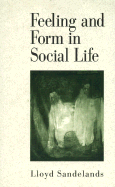
About this title:
Feeling and Form in Social Life
shows how a vigorous and practical science of society can be
built. Drawing in part from the philosophy of Susanne
Langer, Lloyd Sandelands reveals human societies to be forms
of life known intuitively as feelings of a whole rather than
as observed interactions of persons. These feelings, which
are personal and subjective, are made public and objective
by the uniquely human capacity for artistic abstraction.
Through art, people turn invisible feelings and forms of
society into visible objects and performances that can be
shared and studied scientifically. The book brings this idea
of society to life with diverse examples of social feelings
and forms expressed in a stadium chant, folk dance, gift
ritual, tree symbol, photograph, and organizational chart.
Sandelands concludes with a powerful discussion of the
implications of this idea for expanding the scope of social
science and for resolving its persistent underlying
confusions.
The
Conceit of Innocence: Losing the Conscience of the West in
the War Against Bosnia
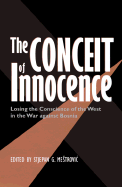
About this title:
Innocence may be lost in the
post-Cold War West with regard to democratic reform in
Eastern Europe, but the practice of a "conceit" of
innocence--or imitation of a purity of action commonly
associated with the 1950s--is the theme explored in this
unusual collection of essays contributed by a number of
varied professionals, ranging from sociologist,
anthropologist, journalist, political scientist, and other
fields.
Genocide
After Emotion: The Postemotional Balkan War
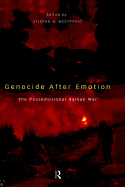
About this title:
The failure to adequately respond
on the part of the major Western superpowers to the
atrocities in the Balkans constitutes a major moral and
political scandal. In "Genocide After Emotion Mestrovic and
the contributors thoroughly interrogate the war, its media
coverage and response in the West. The result is alarming,
both for the progress of the war and for the condition of
our society today: the authors argue that the West is
suffering from a 'postemotional' condition - we are beyond
caring about anything anymore. This book contains
contributions from Philip J. Cohen, Norman Cigar, Slaven
Letica, James J. Sadkovich, C.G. Schoenfeld, Thomas Cushman
and Igor Primoratz.
Road
from Paradise
by Stjepan G. Mestrovic, Slaven Letica, & Miroslav
Goreta
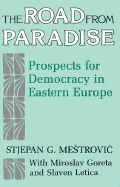
About this title:
Are we really at the "end of
history", as some have claimed? Has the United States really
won the Cold War? Will liberal democracy now triumph over
nationalism and totalitarianism? The authors of this book
warn that history may already have returned in newly free
Eastern Europe, with war in the Balkans, capitalism not yet
established, and a number of new democracies already turning
autocratic. The West has responded to these sinister
developments with paralysis and confusion. The 1989 fall of
communism in Eastern Europe occurred in a period when
Western intellectuals were involved in a confusing discourse
on a number of other dramatic endings: the end of modernity,
the end of the century, even the possible end of sociology.
Against this backdrop, the authors focus on continuities
based on the "habits of the heart" of those who threw off
communism in Eastern Europe, contrasting them with Western
modes of thought. Their cultural explanation draws on
theories of Tocqueville, Durkheim, and others to examine
positive as well as negative aspects of the nations that
survived communism. While focusing on the Balkans, they also
make cautious prognoses for the rest of Eastern Europe. They
conclude that, in addition to the scenario desired by the
West - establishment of a market economy, democracy, and
pluralism in postcommunist lands - other possible scenarios
need to be recognized, including continued balkanization,
conflict, and chaos, and the emergence of new totalitarian
states. If the West is to plant democracy in Eastern Europe,
it must base its actions on a realistic appraisal of the
historical and cultural forces at work. Boosterish optimism
and unrealistic hopes, they warn, are an unrealistic
response to the fall of communism.
Coming
Fin de Siecle: An Application of Durkheim's Sociology to
Modernity and Postmodernism
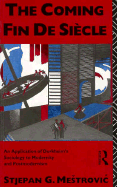
About this title:
The Coming Fin de Siecle uses
Durkheim's sociological theories to sort out the confusion
surrounding the debate on modernity and postmodernity.
Stjepan Mestrovic argues that striking parallels can be
drawn between today and the social context of the 1890s,
when Durkheim first began to publish his work in book form.
Re-examining the fin de siecle spirit of the 19th century,
Mestrovic argues that the fruits of the Enlightenment are
either dead or dying, and concludes that a new liberalism
can be founded on Nietzsche's and Durkheim's "cult of
feeling"--a doctrine of benign irrationalism.
Anthony
Giddens: The Last Modernist
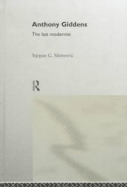
About this title:
Anthony Giddens is arguably the
world's leading sociologist. In this controversial
contribution to the Giddens debate, Stjepan Mestrovic takes
up and criticizes the major themes of his work -
particularly the concept of 'high modernity' as opposed to 'postmodernity'
and his attempted construction of a 'synthetic' tradition
based on human agency and structure. Testing Giddens'
theories against what is happening in the real world from
genocide in Africa to near secession in Quebec, Mestrovic
discerns in the construction of synthetic traditions not the
promise of freedom held out by Giddens but rather the
ominous potential for new forms of totalitarian control.
Thorstein Veblen: On Culture and
Society
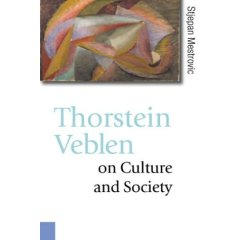
Book Description
Best known as the author of the acclaimed book, The
Theory of the Leisure Class (1899), Thorstein Veblen was
much more than a one-book wonder. He is in fact a seminal
classical sociologist who made many original contributions
to the study of culture and society. This inspired selection
conveys the full zest and penetrating insights of Veblen's
writings.The collection comes with a full-length essay which
demonstrates the continuing relevance of Veblen's sociology.
Text includes Thorstein Veblen's thoughts on the instability
of knowledge and belief, the technology of predatory
culture, sabotage, patriotism, the barbarian status of
women, and credit culture. Introductory chapter contends
that Veblen may be considered the first genuine sociologist
of consumer society.
Dr.
Elwell's Home Page
©Frank Elwell
Send comments to [email protected]
.
|